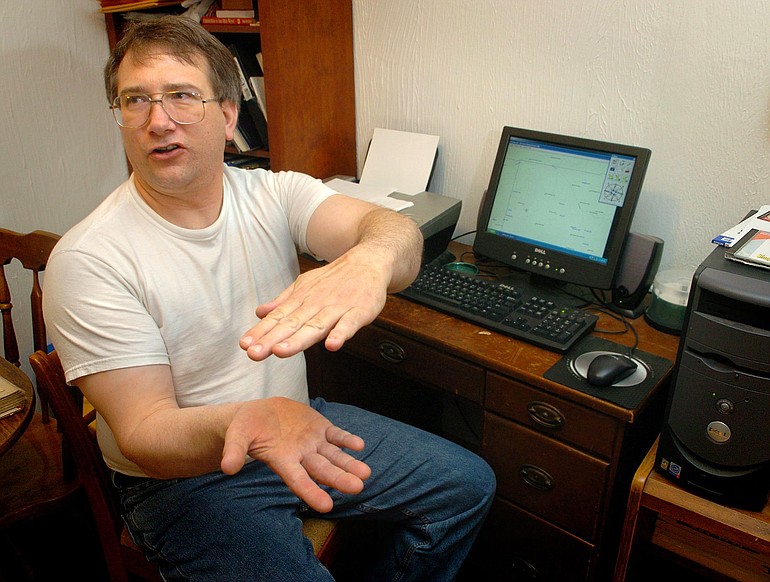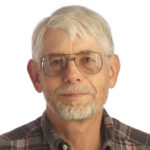Originally published May 15, 2005
After sitting around their campfire until 3 a.m., Danny Jay Balch and Brian Thomas were sleeping in.
Balch was jolted awake, and he realized something was happening when he saw his friend’s face.
“I watched his eyes open up and get very big,” Balch said.
He turned and looked out the tent window to see what Thomas was staring at.
“A white cloud was turning red and black,” Balch said.
It was the eruption of Mount St. Helens, and the blast was heading toward the meadow they were sharing with four other campers.
By nightfall, Balch would be in a hospital, being treated for severe burns after walking more than 11 miles to safety, much of it barefoot.
Thomas would be hospitalized with a broken hip, and two of his friends would be dead.
It was a weekend of history and tragedy.
It actually was a weekend he’d planned to spend at the beach.
That Thursday, Balch went to Thomas’ house, where he met two other friends of Brian Thomas. They talked over weekend plans. Bruce Nelson and Terry Crall were going camping with their girlfriends, Sue Ruff and Karen Varner, along the Green River, 16 miles north of Mount St. Helens; they urged Balch and Thomas to join them.
But Balch wanted to go to the beach; he and Thomas were getting ready to leave Friday when Thomas finally persuaded Balch to change plans.
“Brian finally got me to give in and go to Green River,” Balch, 45, said. “I had never been there, and he said it was very beautiful.”
A dash for life
That changed at 8:32 a.m. on May 18, 1980, when the volcano erupted. Balch said he and Thomas dashed from their tent and were heading for the shelter of some trees when the day turned black.
Balch was hit by a tree-flattening blast of heat and a shower of ash, mud and ice that caked him in grit and pushed him flat to the ground. In seconds, he went from frozen to baked.
When Balch got up, he yelled for Thomas, then crawled into the river to soothe his burned hands and left leg in the river’s warm, muddy water.
He resumed his search, scrambling over downed trees until he felt a hand on his left shoulder that pushed him off balance. Balch said he looked down and saw Thomas under a tangle of tree limbs.
Without that hand on his shoulder it was the Lord’s doing, is all Balch can figure “I’d have never found him.”
Thomas had a broken hip, and the skin was peeling off Balch’s burned hands. But somehow Balch was able to pull his friend up to the top of the tangle just as ash started to fall. It fell so thickly that, “I couldn’t even see Brian’s head just inches in front of mine.”
“I was in so much pain I was screaming at times,” Balch recounted in his journal.
Two other campers in the group, Nelson and Ruff, were toasting marshmallows for breakfast when the volcano erupted; the Kelso residents headed for shelter, then, in the sudden darkness, tumbled into a hole left by a couple of uprooted trees.
Thomas’ other two friends, Crall and Varner, were found dead in their tent, killed by a falling tree.
Balch and Thomas were still on the pile of tree debris two hours after the blast, shirt collars pulled over their noses and mouths to screen out ash, when Balch saw Nelson and Ruff making their way through the downed trees toward them.
It was the first time Balch knew anybody else in their group had survived. The two men carried Thomas to the ruins of an old cabin, where they built a makeshift lean-to.
Leaving Thomas behind, Balch, Nelson and Ruff then hiked out, but soon split up.
“I didn’t have shoes,” Balch said. He’d been scrambling from downed tree to downed tree to avoid hot ash that was 2 feet deep in places.
He continued west, wading in the river as much as possible. Two miles later, he came across a Castle Rock man, Buzz Smith, and his two sons, 7 and 10. Balch borrowed a pair of Smith’s canvas high-top tennis shoes.
Balch remembers resting underneath a bridge, snacking on red licorice strings from Smith’s pack. A logger joined the group and they were spotted at about 6 p.m. by two rescue helicopters.
But Balch didn’t forget about his injured friend.
“I showed them on their map where Brian was. They looked at me like I was crazy.”
But Smith told the rescuers that he and his two boys had walked even farther than that.
“They still didn’t look like they believed us, but we told them about Bruce and Sue,” Balch said.
One helicopter flew off to pick up Bruce Nelson and Sue Ruff, as well as a logger who’d joined them.
“Bruce and Sue refused to get in unless somebody went for Brian,” Balch said.
Balch was airlifted to St. John Medical Center in Longview, where Thomas also was hospitalized. Once the Demerol kicked in, Balch didn’t regain consciousness until the following Sunday.
Balch was back on the job two months later at Longview Fibre. In 2005, he still had some lingering lung damage from the ash. “I love karaoke, but if I’m in a place with too much smoke, I can’t sing,” he said.
Thomas died in 2001 of lung cancer, at the age of 43. His friend was a smoker, Balch said, but he suspects the volcanic ash was a factor in Thomas’ death.
With Balch unconscious, it was left to the hospital staff to handle one important detail: tell his parents that their 20-year-old son had survived the eruption.
They didn’t even know he’d been there, Balch said: “They thought I was at the beach.”




